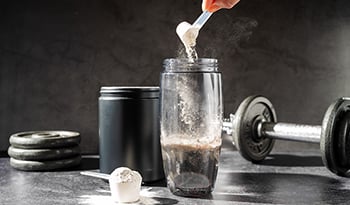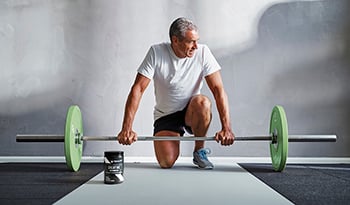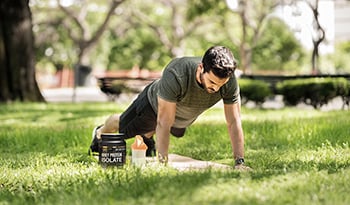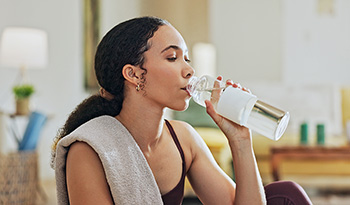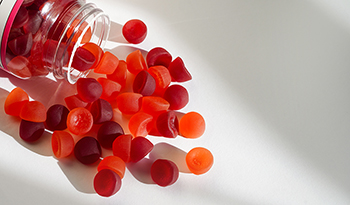Κρεατίνη για γυναίκες: 5 απίστευτα οφέλη
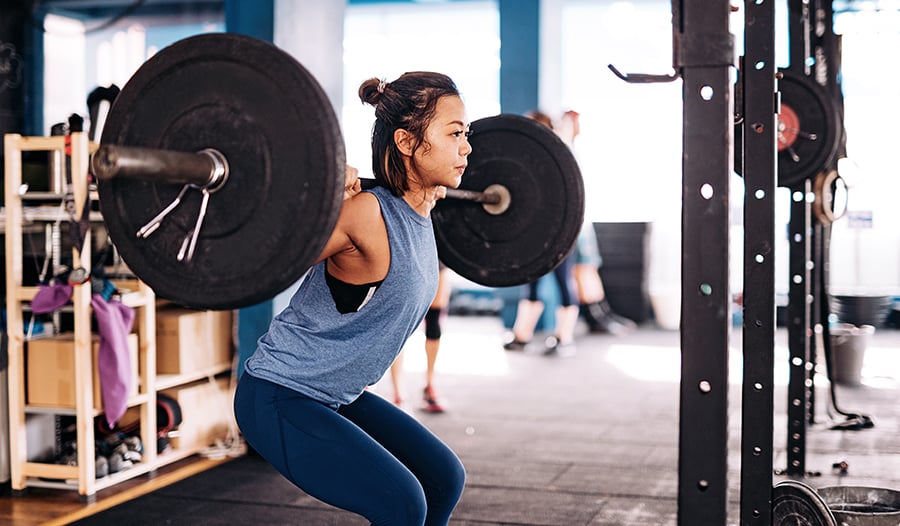
Αρχικά δημοσιεύτηκε τον Αύγουστο 2024/Ενημερώθηκε τον Φεβρουάριο του 2025
Η κρεατίνη είναι ένα από τα πιο δημοφιλή συμπληρώματα διατροφής. Ωστόσο, η χρήση του ήταν ιστορικά πιο δημοφιλής στους άνδρες. Αυτό αλλάζει καθώς περισσότερες γυναίκες όλων των ηλικιών ανακαλύπτουν τα πολλά οφέλη για την υγεία της κρεατίνης, συμπεριλαμβανομένης της υγείας των μυών και της απόδοσης άσκησης, των αντιγηραντικών επιδράσεων και των ευεργετικών επιδράσεων στη διάθεση, τη λειτουργία του εγκεφάλου, την ποιότητα ζωής και την υγεία της καρδιάς. Στην πραγματικότητα, η έρευνα δείχνει ότι οι γυναίκες μπορεί να επωφεληθούν περισσότερο από τη συμπλήρωση κρεατίνης από τους άνδρες.1
Τι είναι η κρεατίνη;
Η κρεατίνη είναι μια φυσική ένωση που παράγεται στο σώμα. Είναι κατασκευασμένο από τα αμινοξέα αργινίνη, γλυκίνη ή μεθειονίνη. Ο μέσος άνθρωπος έχει περίπου 120 γραμμάρια κρεατίνης στο σώμα του, αλλά μπορεί να αποθηκεύσει έως και 160 γραμμάρια κυρίως ως φωσφορική κρεατίνη. Το μεγαλύτερο μέρος της κρεατίνης του σώματος αποθηκεύεται στους σκελετικούς μυς. Μικρές ποσότητες κρεατίνης βρίσκονται επίσης στον εγκέφαλο, την καρδιά, τους όρχεις και άλλα όργανα.
Τι κάνει η κρεατίνη;
Η κύρια λειτουργία του σώματος της φωσφορικής κρεατίνης είναι η ενίσχυση της παραγωγής ενέργειας στους μύες για γρήγορες εκρήξεις ισχύος και ταχύτητας, αλλά είναι επίσης σημαντική για τη λειτουργία του εγκεφάλου. Όταν ένα μυϊκό κύτταρο συστέλλεται απαιτεί ενέργεια που παράγεται από την απελευθέρωση μιας φωσφορικής ομάδας από τριφωσφορική αδενοσίνη (ATP), η οποία στη συνέχεια μετατρέπεται σε διφωσφορική αδενοσίνη (ADP). Η φωσφορική κρεατίνη δωρίζει τη φωσφορική της ομάδα για να μετατρέψει το ADP πίσω σε ATP, επιτρέποντάς της να απελευθερώσει τη φωσφορική ομάδα που δωρίζεται από τη φωσφορική κρεατίνη για ενέργεια.
Τα αποτελέσματα παραγωγής ενέργειας της φωσφορικής κρεατινίνης εμφανίζονται επίσης σε άλλους ιστούς, ιδιαίτερα στον εγκέφαλο και την καρδιά. Στην πραγματικότητα, ο εγκέφαλος έχει τις υψηλότερες ενεργειακές ανάγκες από οποιονδήποτε ιστό του σώματος. Η ενίσχυση των επιπέδων ενέργειας σε οποιοδήποτε κύτταρο ενισχύει τη λειτουργία του. Και αυτός είναι ένας σημαντικός στόχος για τη βελτίωση της συνολικής υγείας. Εκτός από το ρόλο της στην ενίσχυση της κυτταρικής ενέργειας, η κρεατίνη ασκεί αντιοξειδωτικά, αντιφλεγμονώδη και ανοσουποστηρικτικά αποτελέσματα.
Οφέλη για την υγεία της κρεατίνης για τις γυναίκες
Οι γυναίκες μπορεί να επωφεληθούν περισσότερο από τα συμπληρώματα κρεατίνης από τους άνδρες, καθώς οι γυναίκες έχουν 70-80% χαμηλότερα επίπεδα κρεατίνης στο σώμα τους σε σύγκριση με τους άνδρες, συμπεριλαμβανομένου του εγκεφάλου. Η συμπλήρωση με κρεατίνη έχει ως αποτέλεσμα την αύξηση των αποθεμάτων φωσφορικής κρεατίνης στο σώμα και στον εγκέφαλο, η οποία είναι η ενεργή μορφή της κρεατίνης.
Η κρεατίνη έχει αποδειχθεί ότι ενισχύει την αθλητική απόδοση, χτίζει δύναμη και υποστηρίζει την ανάπτυξη των μυών. Αυτά τα αποτελέσματα είναι γνωστά, αλλά υπάρχουν πολλά πρόσθετα οφέλη για την υγεία για τις γυναίκες που δεν είναι τόσο γνωστά.1 Εδώ είναι τα κορυφαία 5 οφέλη για την υγεία των συμπληρωμάτων κρεατίνης για τις γυναίκες.
1. Η κρεατίνη μπορεί να βελτιώσει την απόδοση άσκησης στις γυναίκες
Η κρεατίνη συμβάλλει στην ταχεία παραγωγή ενέργειας στα κύτταρα σας για να ενισχύσει την έκρηξη ισχύος ή ταχύτητας που απαιτείται κατά τη διάρκεια σύντομων περιόδων αναερόβιας άσκησης ή δραστηριότητας. Η κρεατίνη βοηθά επίσης τους μυς να αποθηκεύουν το γλυκογόνο, τη μορφή αποθήκευσης της γλυκόζης (σάκχαρο στο αίμα). Κατά τη διάρκεια της αναερόβιας άσκησης, το γλυκογόνο μετατρέπεται σε γλυκόζη, η οποία στη συνέχεια καίγεται για ενέργεια. Αυτό μπορεί να βοηθήσει στην αθλητική απόδοση, ειδικά για σύντομες, επαναλαμβανόμενες εκρήξεις αναερόβιας δραστηριότητας, όπως αυτές που απαιτούνται για άρση βαρών, σπριντ, cross-fit και πολλά αθλήματα. Η κρεατίνη βοηθά επίσης τους μυς να ανακάμψουν μετά την άσκηση, καθώς η ενέργεια που προέρχεται από τη γλυκόζη είναι απαραίτητη για την επούλωση.1-5
2. Η κρεατίνη μπορεί να βοηθήσει τις γυναίκες να χτίσουν μυϊκή μάζα
Είναι σημαντικό να σημειωθεί ότι η συμπλήρωση κρεατίνης από μόνη της δεν χτίζει μυς, πρέπει να συνδυάζεται με προπόνηση άσκησης αντίστασης, όπως άρση βαρών ή εκτέλεση ασκήσεων που χρησιμοποιούν το σωματικό βάρος ως αντίσταση. Ο συνδυασμός τακτικής προπόνησης αντίστασης, επαρκούς πρόσληψης πρωτεϊνών και συμπληρωμάτων κρεατίνης μπορεί να βοηθήσει τις γυναίκες να χτίσουν μυϊκή μάζα.1,6,7 Ωστόσο, επειδή οι γυναίκες δεν έχουν τα πρόσθετα μυϊκά προάγοντα αποτελέσματα της υψηλής τεστοστερόνης, ο βαθμός αύξησης της μυϊκής μάζας δεν είναι στο ίδιο επίπεδο με τους άνδρες.
Όταν το συμπλήρωμα κρεατίνης συνδυάστηκε με προπόνηση βάρους ή αντίστασης σε άνδρες, ανεξαρτήτως ηλικίας, προκάλεσε μια μέση αύξηση της άπαχης σωματικής μάζας κατά 1,46 κιλά (3,2 λίβρες) ενώ στις γυναίκες, αυτή η αύξηση ήταν σημαντικά μικρότερη στα 0,29 κιλά (0,6 λίβρες).7 Αυτή εξακολουθεί να είναι μια σημαντική αύξηση στις γυναίκες.
3. Η κρεατίνη μπορεί να βοηθήσει τις γυναίκες να αποτρέψουν την απώλεια μυών, δύναμης και οστών που σχετίζονται με την ηλικία
Τα συμπληρώματα κρεατίνης είναι ένα σημαντικό στοιχείο για την καταπολέμηση της σαρκοπενίας που σχετίζεται με την ηλικία, της απώλειας μυϊκής μάζας και λειτουργίας που συμβαίνει καθώς μεγαλώνουμε. Η συμπλήρωση κρεατίνης σε μετεμμηνοπαυσιακές γυναίκες παράγει βελτιωμένη μυϊκή δύναμη και αυξημένη μυϊκή μάζα. Μειώνει επίσης τους δείκτες φλεγμονής, οξειδωτικής βλάβης και απώλειας οστικής μάζας. Η συμπλήρωση κρεατίνης σε συνδυασμό με την προπόνηση αντοχής βελτιώνει την υγεία των μυών και των οστών για τις μετεμμηνοπαυσιακές γυναίκες Αυτό που δείχνει όλη αυτή η έρευνα είναι ότι η συμπλήρωση κρεατίνης είναι ένα σημαντικό συμπλήρωμα στη διατροφή και την άσκηση βοηθώντας τις γυναίκες να διατηρήσουν τη μυϊκή μάζα και την οστική πυκνότητα καθώς μεγαλώνουν.1,8-10
4. Η κρεατίνη μπορεί να βελτιώσει τη διάθεση και την ψυχική υγεία στις γυναίκες
Δεδομένου ότι τα υψηλότερα επίπεδα εγκεφαλικής ενέργειας σχετίζονται με πιο θετικές βαθμολογίες διάθεσης και βελτιωμένη ψυχική λειτουργία, η ικανότητα της κρεατίνης να ενισχύει τον μεταβολισμό της ενέργειας του εγκεφάλου υποδηλώνει ότι μπορεί να έχει οφέλη σε αυτές τις περιοχές. Έρευνες έχουν δείξει ότι η συμπλήρωση κρεατίνης ενισχύει την παραγωγή ενέργειας του εγκεφάλου σε βασικές περιοχές του εγκεφάλου και είναι σε θέση να βελτιώσει τα συναισθήματα άγχους ή στρες, τη διάθεση και την ψυχική κόπωση στις γυναίκες.1,8-13
Είναι πολύ λογικό ότι η κρεατίνη θα έδειχνε αυτά τα οφέλη καθώς ο εγκέφαλος απαιτεί σημαντική ποσότητα ATP για να εκτελέσει πολλαπλές εργασίες. Η συμπλήρωση κρεατίνης ενισχύει τα επίπεδα φωσφοκρεατίνης στον εγκέφαλο, γεγονός που με τη σειρά του οδηγεί σε ενισχυμένο σχηματισμό ATP που απαιτείται για την υποστήριξη των λειτουργιών του εγκεφάλου.
Ο εγκέφαλος μιας γυναίκας μπορεί να είναι πιο ευαίσθητος σε χαμηλά επίπεδα κρεατίνης καθώς τα ευρήματα δείχνουν ότι οι γυναίκες έχουν χαμηλότερα επίπεδα κρεατίνης στον εγκέφαλο σε σύγκριση με τους άνδρες, ειδικά στον μετωπιαίο λοβό, την περιοχή του εγκεφάλου που ελέγχει το συναίσθημα, τη διάθεση, τη γνώση και τη μνήμη.1 Η συμπλήρωση κρεατίνης ενισχύει τις ψυχικές εργασίες που βασίζονται στον μετωπιαίο φλοιό, όπως η μάθηση, η μνήμη και η προσοχή. Επιπλέον, οι μειώσεις της ψυχικής λειτουργίας που σχετίζονται με την ηλικία μπορούν επίσης να μειωθούν με τη συμπλήρωση κρεατίνης.10,13
Το συμπέρασμα από όλα αυτά τα δεδομένα είναι ότι τα συμπληρώματα κρεατίνης παρέχουν τόσο θετικές επιδράσεις στην ψυχική υγεία των γυναικών όσο και στη σωματική υγεία.
5. Η κρεατίνη μπορεί να βοηθήσει στη μείωση των σημείων γήρανσης στο δέρμα
Η κρεατίνη είναι επίσης σημαντική για την υγεία του δέρματος καθώς συμβάλλει σημαντικά στην παραγωγή ενέργειας στα κύτταρα του δέρματος. Προκαταρκτική έρευνα δείχνει ότι το συμπλήρωμα κρεατίνης μπορεί να βοηθήσει στην προστασία του δέρματος από βλάβες και έτσι να αποτρέψει την απώλεια της ελαστικότητας του δέρματος και την ανάπτυξη ηλιακών βλαβών, λεπτών γραμμών και ρυτίδων.14 Εκτός από το στοματικό συμπλήρωμα, πολλές αντιγηραντικές κρέμες προσώπου και τοπικές λοσιόν έχουν κρεατίνη ως συστατικό για να ενισχύσουν τη σύνθεση κολλαγόνου, τη σφριγηλότητα του δέρματος και την ελαστικότητα του δέρματος και να μειώσουν τις λεπτές γραμμές και τις ρυτίδες. Η τοπική εφαρμογή κρεατίνης αποδείχθηκε ότι ενισχύει την παραγωγή κολλαγόνου.15
Δοσολογία & Σκέψεις
Η Διεθνής Εταιρεία Αθλητικής Διατροφής συνιστά 3-5 γραμμάρια κρεατίνης την ημέρα. Μελέτες δείχνουν ότι η χορήγηση υψηλότερης δόσης κρεατίνης δεν προσφέρει πλεονεκτήματα.2
Η μονοϋδρική κρεατίνη είναι η πιο συχνά χρησιμοποιούμενη μορφή και η πιο μελετημένη. Θεωρείται γενικά ως η πιο αποτελεσματική μορφή. Η μονοϋδρική κρεατίνη μπορεί να αυξήσει τα επίπεδα φωσφοκρεατίνης στο σώμα κατά 15-40%.2
Τα συμπληρώματα κρεατίνης συνήθως λαμβάνονται με τη μορφή σκόνης, κάψουλας ή δισκίου. Η κονιοποιημένη μορφή είναι η πιο κοινή δεδομένου του εύρους δοσολογίας 3-5 γραμμαρίων. Η κρεατίνη είναι άοσμη και άγευστη, καθιστώντας την ιδανική για ανάμιξη σε νερό, χυμό ή smoothie χωρίς να αλλάζει η γεύση. Όσον αφορά το χρονοδιάγραμμα, μπορεί να υπάρχουν ορισμένα πλεονεκτήματα στη λήψη κρεατίνης μετά από προπονήσεις όσον αφορά τη βελτίωση της μυϊκής μάζας και της δύναμης.
Ασφάλεια κρεατίνης και παρενέργειες
Η Διεθνής Εταιρεία Αθλητικής Διατροφής κατέληξε στο συμπέρασμα ότι η κρεατίνη είναι ασφαλής και καλά ανεκτή τόσο στη βραχυπρόθεσμη όσο και στη μακροχρόνια χρήση. Αυτή η γνώμη βασίζεται σε πάνω από χίλιες κλινικές μελέτες σε ανθρώπους με συμμετέχοντες που κυμαίνονται σε ηλικία από τη βρεφική ηλικία έως την προχωρημένη ηλικία. Η κρεατίνη είναι επίσης στην αγορά από τη δεκαετία του 1990 με δισεκατομμύρια μερίδες κρεατίνης. Προηγούμενες αναφορές ανεπιθύμητων ενεργειών ή πιθανών ανεπιθύμητων ενεργειών έχουν διαψευσθεί σε καλά ελεγχόμενες κλινικές μελέτες σε ανθρώπους. Συγκεκριμένα, η χρήση της μονοϋδρικής κρεατίνης έναντι άλλων μορφών κρεατίνης είναι η πιο καλά ανεκτή μορφή κρεατίνης.16
Η κρεατίνη μπορεί να οδηγήσει σε προσωρινή αύξηση βάρους στις γυναίκες. Ωστόσο, αυτό το αποτέλεσμα δεν οφείλεται στην αύξηση του σωματικού λίπους, αλλά στην ικανότητα της κρεατίνης να βοηθά τους μυς να αποθηκεύουν περισσότερο γλυκογόνο και νερό. Αυτό μπορεί να αυξήσει τη μυϊκή μάζα, οδηγώντας σε αύξηση του συνολικού σωματικού βάρους.
Παραπομπές:
- Σμιθ-Ράιαν ΑΕ, Κάμπρ ΧΕ, Έκερσον Τζέι Μ., Κάντοου ΓΔ. Συμπλήρωμα κρεατίνης στην υγεία των γυναικών: Μια προοπτική διάρκειας ζωής. Θρεπτικά συστατικά. 2021 8 Μαρτίου. 13 (3): 877.
- Κράιντερ ΡΒ, Στάουτ Τζούνιορ. Κρεατίνη στην υγεία και τις ασθένειες. Θρεπτικά συστατικά. 2021 29 Ιανουαρίου 13 (2) :447.
- Φερνάντες-Λάντα Τζέι, Σαντιμπανιές-Γκουτιέρρεζ Α, Τοντόροβιτς Ν, Στάιερ Β, Οστόιτς ΣΜ. Επιδράσεις της μονοϋδρικής κρεατίνης στην απόδοση αντοχής σε έναν εκπαιδευμένο πληθυσμό: Μια συστηματική ανασκόπηση και μετα-ανάλυση. Αθλητική ιατρική 2023 Μάιος; 53 (5): 1017-1027.
- Κερί Β, Κέρκσικ Κ.Μ., Τζάγκιμ ΑΡ, και συν. Κρεατίνη για άσκηση και αθλητική απόδοση, με εκτιμήσεις αποκατάστασης για υγιείς πληθυσμούς. Θρεπτικά συστατικά. 2021 2 Ιουνίου. 13 (6) :1915.
- Φορμπς SC, Κάντοου ΓΔ, Νέτο JHF, κ.α. Συμπλήρωμα κρεατίνης και απόδοση αντοχής: υπερτάσεις και σπριντ για να κερδίσετε τον αγώνα. J Int Soc Αθλητικές Εκδόσεις 2023 Δεκέμβριος 20 (1): 2204071.
- Μπερκ Ρ, Πινιέρο Α, Κόλμαν Μ, και συν. Οι επιδράσεις της συμπλήρωσης κρεατίνης σε συνδυασμό με την προπόνηση αντίστασης σε περιφερειακά μέτρα μυϊκής υπερτροφίας: Μια συστηματική ανασκόπηση με μετα-ανάλυση. Θρεπτικά συστατικά. 2023 28 Απριλίου 15 (9): 2116.
- Ντελπίνο FM, Φιγκεϊρέντο Λ.Μ., Φορμπς ΣΚ, Κάντοου ΓΓ, Σάντος ΧΟ. Επίδραση της ηλικίας, του φύλου και του τύπου άσκησης στην αποτελεσματικότητα της συμπλήρωσης κρεατίνης στην άπαχη μάζα σώματος: Μια συστηματική ανασκόπηση και μετα-ανάλυση τυχαιοποιημένων κλινικών δοκιμών. Διατροφή. 2022 Νοε
- Chilibeck PD, Candow DG, Landeryou T, Kaviani M, Paus-Jenssen L. Επιδράσεις της κρεατίνης και της προπόνησης αντίστασης στην υγεία των οστών σε μετεμμηνοπαυσιακές γυναίκες. Αθλητική άσκηση ιατρικής επιστήμης 2015; 47 (8): 1587-1595.
- Κάντοου ΓΔ, Φορμπέζ SC, Τσίλιμπεκ κ.α. Αποτελεσματικότητα του συμπληρώματος κρεατίνης στη γήρανση των μυών και των οστών: Εστίαση στην πρόληψη των πτώσεων και τη φλεγμονή. J Clin Med. 2019 11 Απριλίου. 8 (4): 488.
- Φορμπς ΣΚ, Κάντοου ΓΔ, Φερέιρα ΛΧΒ, Σούζα-Τζούνιορ Τ.Π. Επιδράσεις της συμπλήρωσης κρεατίνης στις ιδιότητες της λειτουργίας των μυών, των οστών και του εγκεφάλου σε ηλικιωμένους ενήλικες: Μια αφηγηματική ανασκόπηση. J Προσθήκη διατροφής 2022; 19 (3) :318-335.
- Ρόσελ Χ, Γκουαλάνο Β, Οστόιτς ΣΜ, Ρόουσον Ε.Σ. Συμπλήρωμα κρεατίνης και υγεία εγκεφάλου. Θρεπτικά συστατικά. 2021 10 Φεβρουαρίου. 13 (2) :586.
- Juneja K, Bhuchakra HP, Sadhukhan S, Mehta I, Niharika A, Thareja S, Nimmakayala T, Sahu S. Συμπλήρωμα κρεατίνης στην κατάθλιψη: Μια ανασκόπηση των μηχανισμών, της αποτελεσματικότητας, των κλινικών αποτελεσμάτων και των μελλοντικών κατευθύνσεων. Κουρέας. 2024 16 Οκτωβρίου. 16 (10): e71638.
- Xu C, Bi S, Zhang W, Luo L. Οι επιδράσεις της συμπλήρωσης κρεατίνης στη γνωστική λειτουργία σε ενήλικες: μια συστηματική ανασκόπηση και μετα-ανάλυση. Μπροστινό Νοέμβριο 2024 12 Ιουλίου 11:1424972.
- Λενζ Η, Σμιντ Μ, Γουέλγκε Β, και συν. Το σύστημα κινάσης κρεατίνης στο ανθρώπινο δέρμα: προστατευτικές επιδράσεις της κρεατίνης έναντι οξειδωτικής και υπεριώδους βλάβης in vitro και in vivo. J Invest δερματοόλη. 2005.
- Πειράνο ΡΙ, Άχτερμπεργκ Β, Ντούσινγκ ΧΤζ, και συν. Η δερματική διείσδυση της κρεατίνης από ένα σκεύασμα περιποίησης προσώπου που περιέχει κρεατίνη, γκουαράνα και γλυκερόλη συνδέεται με αποτελεσματική αντιρυτιδική και αντιχαλαρωτική αποτελεσματικότητα σε άνδρες ασθενείς. J Κοσμέτ δερματολ. 2011 Δεκέμβριος 10 (4): 273-81.
- Κράιντερ ΡΒ, Κάλμαν Δ.Σ., Αντόνιο Τζ, και συν. Θέση της Διεθνούς Εταιρείας Αθλητικής Διατροφής: ασφάλεια και αποτελεσματικότητα των συμπληρωμάτων κρεατίνης στην άσκηση, τον αθλητισμό και την ιατρική. J Int Soc Αθλητικό Νοέμβριο 2017; 14:18.
- Κερί Β, Κέρκσικ CM, Τζάγκιμ ΑΡ, Μάιο Τζέι Τζέι, Λυών BC, Κράιντερ ΡΒ. Κρεατίνη για άσκηση και αθλητική απόδοση, με εκτιμήσεις αποκατάστασης για υγιείς πληθυσμούς. Θρεπτικά συστατικά. 2021; 13 (6) :1915.
ΑΠΟΠΟΙΗΣΗ ΕΥΘΥΝΗΣ:Αυτό το Κέντρο Ευεξίας δεν προορίζεται να παρέχει διάγνωση...
















































































 Πίνακας περιεχομένων
Πίνακας περιεχομένων





